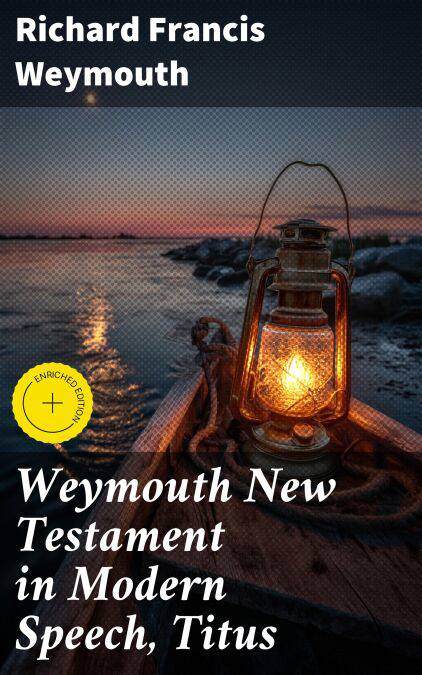
Je cadeautjes zeker op tijd in huis hebben voor de feestdagen? Kom langs in onze winkels en vind het perfecte geschenk!
- Afhalen na 1 uur in een winkel met voorraad
- Gratis thuislevering in België vanaf € 30
- Ruim aanbod met 7 miljoen producten
Je cadeautjes zeker op tijd in huis hebben voor de feestdagen? Kom langs in onze winkels en vind het perfecte geschenk!
- Afhalen na 1 uur in een winkel met voorraad
- Gratis thuislevering in België vanaf € 30
- Ruim aanbod met 7 miljoen producten
Zoeken
Weymouth New Testament in Modern Speech, Titus E-BOOK
Modern Interpretation of Biblical Wisdom in Titus
Richard Francis Weymouth
E-book | Engels
€ 1,99
+ 1 punten
Omschrijving
Richard Francis Weymouth's "Weymouth New Testament in Modern Speech, Titus" boldly reinterprets the biblical text of Titus into contemporary vernacular, fostering accessibility for modern readers. Weymouth's literary style employs a clear, direct prose that prioritizes the message's integrity while removing archaic language, situating the text within a broader movement of early 20th-century translations seeking to bridge theological and linguistic divides. By presenting the epistle within the necessary cultural and historical contexts, Weymouth enhances its relevance, illuminating the essential themes of grace, sound doctrine, and good deeds. A philologist and biblical scholar, Weymouth was influenced by his deep-seated belief in making scripture approachable for a wider audience. His passion for language and communication, combined with a profound understanding of biblical texts, propelled his commitment to translating the New Testament. The pioneering endeavors he embarked upon reflect not only his scholarly rigor but also his profound respect for the spiritual heritage embedded in biblical scripture. This meticulous translation is highly recommended for both academic study and personal reflection. Readers will find Weymouth's work not only enlightening but also deeply engaging, as it invigorates Paul's timeless message within a framework that resonates with contemporary faith practices.
Specificaties
Betrokkenen
- Auteur(s):
- Uitgeverij:
Inhoud
- Aantal bladzijden:
- 102
- Taal:
- Engels
Eigenschappen
- Productcode (EAN):
- 4064066090944
- Verschijningsdatum:
- 15/03/2020
- Uitvoering:
- E-book
- Beveiligd met:
- Digital watermarking
- Formaat:
- ePub

Alleen bij Standaard Boekhandel
+ 1 punten op je klantenkaart van Standaard Boekhandel
Beoordelingen
We publiceren alleen reviews die voldoen aan de voorwaarden voor reviews. Bekijk onze voorwaarden voor reviews.









